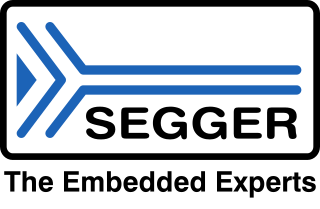Software engineering is an engineering approach to software development. A practitioner, called a software engineer, applies the engineering design process to develop software.
ARM is a family of RISC instruction set architectures (ISAs) for computer processors. Arm Ltd. develops the ISAs and licenses them to other companies, who build the physical devices that use the instruction set. It also designs and licenses cores that implement these ISAs.
Jazelle DBX is an extension that allows some ARM processors to execute Java bytecode in hardware as a third execution state alongside the existing ARM and Thumb modes. Jazelle functionality was specified in the ARMv5TEJ architecture and the first processor with Jazelle technology was the ARM926EJ-S. Jazelle is denoted by a "J" appended to the CPU name, except for post-v5 cores where it is required for architecture conformance.

FreeRTOS is a real-time operating system kernel for embedded devices that has been ported to 40 microcontroller platforms. It is distributed under the MIT License.
The Oracle Certification Program certifies candidates on skills and knowledge related to Oracle products and technologies.
The International Software Testing Qualifications Board (ISTQB) is a software testing certification board that operates internationally. Founded in Edinburgh in November 2002, the ISTQB is a non-profit association legally registered in Belgium.

Segger Microcontroller, founded in 1992, is a private company involved in the embedded systems industry. It provides products used to develop and manufacture four categories of embedded systems: real-time operating systems (RTOS) and software libraries (middleware), debugging and trace probes, programming tools, and in-system programmers. The company is headquartered in Monheim am Rhein, Germany, with remote offices in Gardner, Massachusetts; Milpitas, California; and Shanghai, China.
Apple certification programs are IT professional certifications for Apple Inc. products. They are designed to create a high level of technical proficiency among Macintosh service technicians, help desk support, technical support, system administrators, and professional users. Apple certification exams are offered at Prometric testing centers and Apple Authorized Training Centers, as well as online through Pearson Vue.

The International Requirements Engineering Board (IREB) e.V. was founded in Fürth in Germany in October 2006. IREB e.V. is as a legal entity based in Germany.

Arm Holdings plc is a British semiconductor and software design company based in Cambridge, England, whose primary business is the design of central processing unit (CPU) cores that implement the ARM architecture family of instruction sets. It also designs other chips, provides software development tools under the DS-5, RealView and Keil brands, and provides systems and platforms, system-on-a-chip (SoC) infrastructure and software. As a "holding" company, it also holds shares of other companies. Since 2016, it has been majority owned by Japanese conglomerate SoftBank Group.
Linaro is an engineering organization that works on free and open-source software such as the Linux kernel, the GNU Compiler Collection (GCC), QEMU, power management, graphics and multimedia interfaces for the ARM family of instruction sets and implementations thereof as well as for the Heterogeneous System Architecture (HSA). The company provides a collaborative engineering forum for companies to share engineering resources and funding to solve common problems on ARM software. In addition to Linaro's collaborative engineering forum, Linaro also works with companies on a one-to-one basis through its Services division.

The ARM Cortex-A8 is a 32-bit processor core licensed by ARM Holdings implementing the ARMv7-A architecture.
The Computing Technology Industry Association, more commonly known as CompTIA, is an American non-profit trade association that issues professional certifications for the information technology (IT) industry. It is considered one of the IT industry's top trade associations.
HPE Networking offers trainings, typically delivered in HP Authorized Trainings Centers (ATCs) by HP Certified Instructors (HPCI).
The ARM Cortex-A is a group of 32-bit and 64-bit RISC ARM processor cores licensed by Arm Holdings. The cores are intended for application use. The group consists of 32-bit only cores: ARM Cortex-A5, ARM Cortex-A7, ARM Cortex-A8, ARM Cortex-A9, ARM Cortex-A12, ARM Cortex-A15, ARM Cortex-A17 MPCore, and ARM Cortex-A32, 32/64-bit mixed operation cores: ARM Cortex-A35, ARM Cortex-A53, ARM Cortex-A55, ARM Cortex-A57, ARM Cortex-A72, ARM Cortex-A73, ARM Cortex-A75, ARM Cortex-A76, ARM Cortex-A77, ARM Cortex-A78, ARM Cortex-A710, and ARM Cortex-A510 Refresh, and 64-bit only cores: ARM Cortex-A34, ARM Cortex-A65, ARM Cortex-A510 (2021), ARM Cortex-A715, ARM Cortex-A520, and ARM Cortex-A720.
XMC is a family of microcontroller ICs by Infineon. The XMC microcontrollers use the 32-bit RISC ARM processor cores from ARM Holdings, such as Cortex-M4F and Cortex-M0. XMC stands for "cross-market microcontrollers", meaning that this family can cover due to compatibility and configuration options, a wide range in industrial applications. The family supports three essential trends in the industry: It increases the energy efficiency of the systems, supports a variety of communication standards and reduces software complexity in the development of the application's software environment with the parallel released eclipse-based software tool DAVE.

LPC is a family of 32-bit microcontroller integrated circuits by NXP Semiconductors. The LPC chips are grouped into related series that are based around the same 32-bit ARM processor core, such as the Cortex-M4F, Cortex-M3, Cortex-M0+, or Cortex-M0. Internally, each microcontroller consists of the processor core, static RAM memory, flash memory, debugging interface, and various peripherals. The earliest LPC series were based on the Intel 8-bit 80C51 core. As of February 2011, NXP had shipped over one billion ARM processor-based chips.
The ARM Cortex-A57 is a central processing unit implementing the ARMv8-A 64-bit instruction set designed by ARM Holdings. The Cortex-A57 is an out-of-order superscalar pipeline. It is available as SIP core to licensees, and its design makes it suitable for integration with other SIP cores into one die constituting a system on a chip (SoC).

Platform Security Architecture (PSA) Certified is a security certification scheme for Internet of Things (IoT) hardware, software, and devices. It was created by Arm Holdings, Brightsight, CAICT, Prove & Run, Riscure, TrustCB, and UL as part of a global partnership.







